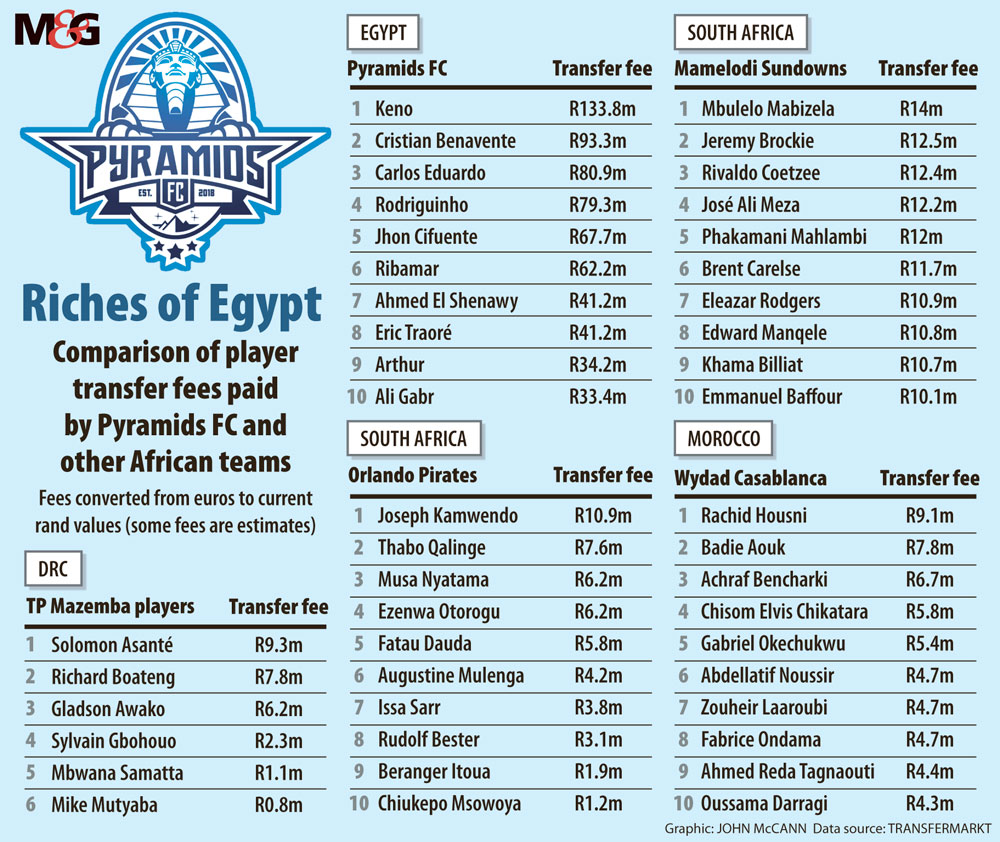General Authority for Saudi Sport, billionaire Turki Al-Sheikh (above), has turned his interests to Egyptian football, securing international names. (Alexandre Schneider/
AFP/Getty Images)
There’s a force growing in the north that could change African football as we know it.
Pyramids FC, a club still unknown to most outside of Egypt, is rising up the ranks with an almost military precision. But it could also just as easily crumble back into the sands.
The mastermind behind the project is Saudi billionaire Turki Al-Sheikh. The trajectory of the club seemingly has and continues to be influenced by his personal revenge mission and geopolitical factors that go far beyond the sport.
The then chairperson of the general sports authority in Saudi Arabia came to Egypt in December 2017 after giants Al Ahly had pleaded for help to save them from financial ruin. What initially looked like a perfect match between the club and its new honorary president soured after Argentine coach Ramón Díaz was redirected away from signing at the last minute and joined Al-Ittihad from Jeddah instead. “Díaz was so close to sign for an Arab club [Al-Ahly], but the Saudi Arabian teams have the priority,” Al-Sheikh said at the time.
Fuelled by an anti-Saudi sentiment and distrust in the region, the side’s fans threw up furious protests and essentially forced him to resign.
Within the next two weeks, Al-Sheikh had bought Al Assiouty Sport, a relatively insignificant mid-table side, and declared his intention to transform the Egyptian game. He quickly changed the name to the more marketable Pyramids FC and moved it to Cairo. Given that the newly branded outfit had no support base in its new city, fans were reportedly hired to attend open-door games (most have been closed in the past four or so years for security reasons).
In the ensuing months, Al-Sheikh’s relationship with fans of Egyptian football grew more strained. In September, he declared he would not invest in the country any longer after Al-Ahly fans happily sung derogatory remarks about his mother. It’s a threat he repeated later that month and said the whole club would withdraw from the league should his request for the use of foreign referees be turned down.
Although his constant complaints about supposed partisan officiating continue and his long-term plans lurk in doubt, the investment has still flowed.
A pharaoh’s wealth
What Pyramids has spent this season is incomparable to anything that has ever been seen on this continent.
Having outlayed over €50-million in only the first window under Al-Sheikh, the club easily set a new African expenditure record.
Players were brought in from all over the world — with a particular emphasis on the Brazilian league. Winger Keno arrived for €8.6-million; Carlos Eduardo for €5.2-million and Rodriguinho for €5.10-million. Rivals were equally plundered and young prospects snatched up.
Last month Cristian Benavente, a former Real Madrid youth product, was a massive coup at €6-million. Ecuador international Jhon Cifuente, meanwhile, was snapped up for €4.4-million.
Some of the best backroom staff and executives have also been lured with promises of a high salary. This month, Al-Sheikh got to throw up a very satisfying middle finger to Al-Ahly after he convinced Díaz, the coach who sparked all the hostility, to join Pyramids.
 General Authority for Saudi Sport, billionaire Turki Al-Sheikh, has turned his interests to Egyptian football, securing international names, such as Rodriguinho from Brazil for his team, Pyramids FC. He has also enticed top backroom staff and Ramón Díaz as coach. (Alexander Nemenov/AFP/Getty Images)
General Authority for Saudi Sport, billionaire Turki Al-Sheikh, has turned his interests to Egyptian football, securing international names, such as Rodriguinho from Brazil for his team, Pyramids FC. He has also enticed top backroom staff and Ramón Díaz as coach. (Alexander Nemenov/AFP/Getty Images)
Instead of drying up as the Saudi promised, the money that has flowed in January suggests he remains defiant in his bid to dominate Egyptian football. The obese sums threaten to belittle the impact of some of the continent’s most renowned investors.
Congolese businessperson Moïse Katumbi, for instance, offered the highest wages in Africa to retain the country’s best players and guide TP Mazembe to multiple CAF Champions League titles.
Patrice Motsepe turned Mamelodi Sundowns into a continental force and gleefully flexed his financial muscle last year by bringing Barcelona to South Africa for a reported €3.5-million.
Neither, however, has been as willing to bring in multimillion-euro players — let alone several such assets in one window.
Unsustainable?
On the pitch, the accelerated boost in performance has reflected the expense. Pyramids sit in second place in the Egyptian league, three points behind Zamalek and six ahead of Al Ahly — albeit having played more games than both. Given that the newest stars will be settling in now, the title charge will likely only intensify.
Whatever the earned success, the club’s fortunes are inescapably tied to those of Al-Sheikh: there is simply not enough money in the sport to sustain the expenses that have been accrued.
Al-Sheikh’s actions have never failed in their impact — or divisiveness. A friend of Crown Prince Mohammed bin Salman (yes, he of brutally murdered journalist Jamal Khashoggi infamy), he has been instrumental in some of Saudi Arabia’s more progressive sporting moves, including helping to open up stadiums to women and ensuring millions are poured into development camps around the country.
Western audiences might have come across his name after he arranged the World Wrestling Entertainment’s two notorious shows in the kingdom; the second took place in the immediate aftermath of Khashoggi’s murder.
It’s unclear why he decided to enter Egyptian football but the encroachment was always going to be a tumultuous one.
At the risk of grossly oversimplifying the present issues, many in Cairo remain resentful of Saudi Arabia’s post-Arab Spring ascent to become the region’s leading superpower. That Al-Sheikh gave Al-Ahly supporters a reason to despise him was perhaps only incidental.
Still, everything he does is seemingly politically motivated or worthy of reaction from all quarters. He even managed to draw the ire of Morocco a week ago after Pyramids posted a seemingly innocuous map on social media on which the country was drawn with Western Sahara cut off (Morocco illegally occupies Western Sahara).
His investment, however, promises to bring riches to everyone in the league. Attracting international stars, severing the duopoly held by perennial giants Zamalek and Al-Ahly, and potentially bringing in more Champions League trophies has many excited about the Pyramids project.
Should the team conquer Egypt, Africa will likely be the next target. Given the fragile egos of billionaire club owners, can we expect them to lie down as this new colonial force in the sport appears to scoop up everything in its wake?
Or is this the beginning of a new era of spending, not only in North Africa, but on the rest of the continent as well?
